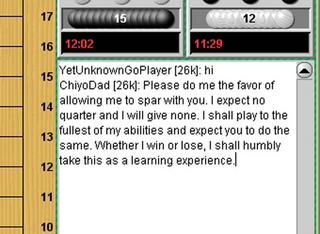How to greet your opponents

I played just an unrated 9x9 game today. I only have time to lurk on KGS in between work and conference calls.
I came across this in one player's info:
When you've lost big, due to error, greed, hurrying, allowing yourself to be bullied, nothing really sounds WORSE than your opponent giving you a plain "thanks." It's as if they're thanking you for every foolish move you made. Then again I suppose, if you're a sadistic[expletive deleted], nothing sounds BETTER than thanking someone for those bad moves, giving you the easy kind of win you tell yourself you deserve. And at the same time, you can congratulate yourself for being so insufferably polite, and completely ignore your total lack of human empathy while laughing safely on the other side of your internet connection.
Have Fun?
I really hate it when someone says that at the beginning of a game. My intent is to make sure that my opponent has no fun at all. If I could find ways to kill everyone of his stones, I wouldn't hesitate to do it. I don't expect that to be fun at all. It's very 'unfun' when I'm on the receiving end of it. At best, it's disengeneous or stupid.
Now I sincerely believe that most of my opponents (and myself for that matter) are not being mean-spirited when we greet and thank each other before and after the game. Most of us would like to keep the whole thing focused but light-hearted. The occasional practice of reviewing games after the match is also an expression of our desire to see all other Go players develop and grow.
And while it's easy to dismiss the above quotes as merely one person's act of reading too much into simple salutations, I have actually wondered myself if there aren't better expressions in English to start and end a match.
As in Go, all kendo matches in Japan are started with the expression Onegaishimasu. It is used in all Japanese martial arts (at least in the dojos that hold to tradition). Literally transliterated from Japanese, the expression means "Please". Translated, it means "Please do me the favor".
When I asked some of the older kendo teachers what the expression meant in its full context before a bout, their answers, summed up, came to this:
Please do me the favor of allowing me to spar with you. I expect no quarter and I will give none. I shall play to the fullest of my abilities and expect you to do the same. Whether I win or lose, I shall humbly take this as a learning experience.
Quite a mouthful and you feel glad that it can be encapsulated in five syllables. It strikes me as both a respectful and humble way to start off a match. But we don't have a short equivalent thereof in English.
I suppose the simple Hi, Hello, Thanks and Good game will still have to suffice.





2 Comments:
Interesting commentary by the other fellow. Frankly, there are a lot of levels that disturb me about that sort of thought. Primarily, that my opponent is the sole source of my fun (or lack thereof) with the game, and also my opponent is the sole source of all the "bad things" that happen.
That's pretty arrogant.
Go is a fair game. I would venture that the good and bad things in the game are contributed by both players about equally. If I have a group that is killed, yes the opponent did the killing, but invariably I could have made a different choice earlier that would have saved them. If I have a particularly successful invasion, was it my own skill, or the lack of my opponents?
So it seems to me that the author of the commentary could be a highly frustrated person by the game of Go.
I do like the onegaishimasu translation. I'll have to try to think of a good summary of that.
Very nice article all in all, I enjoyed it thoroughly.
Many thanks for the compliment on the article.
I often wonder if Japanese neophytes to Go (or any of the competitive arts wherein it is used) are equally aware of the deeper context to onegaishimasu. Expressions gain or lose depth by how they are used and the sincerity behind their use. As one of my college professors once lamented, "Application without understanding cheapens the value of words."
Recently, I've instead chosen to use "Good luck!" in greeting my English-speaking opponents. Admittedly, it makes little sense since Go is a game of skill. But it is an expression that immediately extends goodwill to your opponent and (one would hope) sets the right tone for the match.
Post a Comment
<< Home